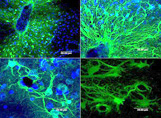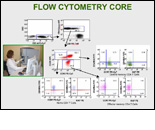 |
||||
The Division of Regenerative Medicine conducts research that utilizes vector-based gene therapies and cell-based interventions for genetic and acquired diseases. The Division consists of nine members including one faculty, four postdoctoral fellows, three research technicians, and one administrative staff. In addition, the Division has one graduate student. Dr. Bruce A. Bunnell, Associate Professor of Pharmacology at Tulane Medical School, is Chairman of the Division.The functions of the Division can be divided into three main areas: 1) Research, 2) Research Resources and 3) Education and Training Opportunities. RESEARCH PROGRAMSThe research component of the Division is active and involves collaborative and independent work in a number of areas. Studies focus on the development of gene and cell-based therapies for diseases of the central nervous and pulmonary systems. The research activities of the Division can be divided into investigations of Regenerative Medicine, stem cell biology and therapeutic applications and characterization of a nonhuman primate model of Krabbe’s disease. Vector-based Regenerative Medicine is a central focus of the Division. This work involves efforts to develop vector-based Regenerative Medicine strategies for Krabbe’s disease. The lab is currently developing a series of lentivirus vectors for the expression of GALC, the defective gene in Krabbe’s disease, both in vitro and in vivo. Our group has also established collaborations with two investigators from the University of Pennsylvania. We are presently investigating the biodistribution and transduction patterns for novel adeno-associated virus (AAV) serotypes and serotypes of lentivirus vectors. The stem cell program is presently focused on three sources of adult stem cells; mesenchymal stem cells (MSCs) from bone marrow and adipose tissue and neural stem cells directly from the brain. In the coming year, we will be collaborating with Don Wolf from the Oregon NPRC by obtaining rhesus embryonic stem cells and doing direct comparisons between these and adult stem cells in the CNS. With our connection to the Krabbe’s Colony, we have begun to focus both of these research areas toward therapy for Krabbe’s disease. The Division is investigating the application of stem cells for pulmonary diseases in collaboration with investigators from the University of Vermont and the University of Pittsburgh. Lastly, the Division is beginning exciting research that assesses the therapeutic benefits provided by various stem cell populations in a nonhuman primate model of stroke. The Division is also responsible for coordinating studies in the only model of genetic disease in nonhuman primates, the Krabbe’s monkey. As such, the Division is focused on the development and analysis of novel Regenerative Medicine strategies for lysosomal storage diseases. More importantly, the Krabbe’s rhesus monkeys are an invaluable national resource that will be available to investigators nationwide.RESEARCH RESOURCESThe Division has a significant service commitment to the Center. These service functions can be divided into two major areas: 1) viral vectors and 2) mesenchymal stem cells. Vector Development and Production Core (VDPC) The VDPC directs the production of the oncoretrovirus, lentivirus, and recombinant AAV vectors. The virus vector production facility maximizes resource utilization and efficiency by centralizing the production of recombinant virus vector production so that it is all done using standard protocols and the same strict guidelines for all of the Regenerative Medicine projects that are pursued at TNPRC. By providing vector core services, the VDPC will have a large impact not only on the Regenerative Medicine Program but also on the Divisions of Comparative Pathology, Microbiology and Immunology at the TNPRC and on other departments and centers at the Tulane University Health Sciences Center. The goals of the Core are:
Stem Cell Production Core (SCPC) Mesenchymal stem cells (MSC) are a subset of adult stem cells from bone marrow or adipose tissue. These cells are of medical and therapeutic interest because they have been shown to differentiate into osteoblasts, adipocytes, chondrocytes, myocytes, astrocytes, oligodendrocytes and neurons. Due to their inherent plasticity, these cells have the potential to be useful for the treatment of a large number of genetic diseases. The Mesenchymal Stem Cell Production Core Facility (SCPC) focuses on generation, maintenance and distribution of nonhuman primate MSCs. We routinely prepare MSCs from rhesus macaque bone marrow and adipose tissue samples. The goals of the Core are:
EDUCATION & TRAINING OPPORTUNITIES (send email) Training opportunities are available in the Division for postdoctoral fellows, graduate students, and veterinary residents and fellows in the following areas: basic biology of bone marrow and adipose tissue derived from mesenchymal stem cells, therapeutic intervention in Krabbe’s disease, therapeutic applications of stem cells for lung diseases and stroke, and viral vector-mediated Regenerative Medicine for CNS diseases. STAFF (View Publications) Chair – Bruce A. Bunnell, PhD, Professor of Pharmacology Faculty Bunnell, Bruce A. PhD, Professor |

|
©2013 Tulane University |
